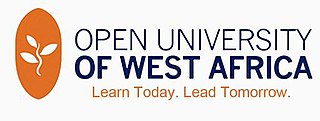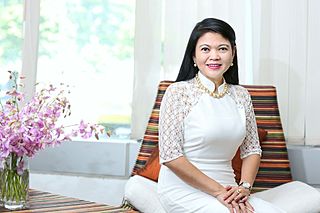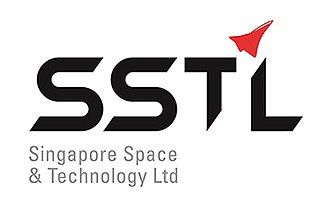A startup or start-up is a company or project undertaken by an entrepreneur to seek, develop, and validate a scalable business model. While entrepreneurship includes all new businesses including self-employment and businesses that do not intend to go public, startups are new businesses that intend to grow large beyond the solo-founder. During the beginning, startups face high uncertainty and have high rates of failure, but a minority of them do go on to become successful and influential.

The National University of Singapore (NUS) is a national public collegiate and research university in Singapore. It was officially established in 1980 by the merger of the University of Singapore and Nanyang University.

Republic Polytechnic (RP) is a post-secondary education institution and statutory board under the purview of the Ministry of Education in Singapore.

One-north is a subzone of Queenstown, Singapore, first developed by JTC Corporation as the country's research and development and high technology cluster. It was first conceptualised in 1991 as part of the National Technology Plan and officially launched on 4 December 2001 by then Deputy Prime Minister Tony Tan Keng Yam.

The University City Science Center (UCSC) is an urban research park in Philadelphia, Pennsylvania, United States.

The Centre for Cellular and Molecular Platforms (C-CAMP) is an initiative of the Department of Biotechnology, Ministry of Science, Technology and Earth Sciences, Govt. of India. Established in 2009 with a mandate to enable cutting edge Life Sciences Research and Innovation, C-CAMP is the country's most exciting life sciences innovation hub bringing together academia, industry and the startup ecosystem - all on one platform. It is also a part of one of the country's earliest bio-clusters, the Bangalore Bio-Cluster.

Open University of West Africa (OUWA) was founded in Ghana in November 2011 by John Roberts and Patrick Steele. With the goal to break the poverty cycle in West Africa through online education, John Roberts and his co-founder were inspired by a simple but contradictory observation: at the moment, higher education penetration in Africa was very low, many of the best universities around the world were beginning to put their courses online through platforms like Coursera, edX, Udacity etc.

HackerspaceSG is a 1,202-square-foot (111.7 m2) technology community center and hackerspace in Singapore. While predominantly an open working space for software projects, HackerspaceSG is also a landmark of the Singapore DIY movement, and also hosts a range of events from technology classes to biology, computer hardware, and manufacturing. The space is open to all types of hackers.
Ayoxxa Biosystems is a biotechnology company founded in 2010 in Singapore, and headquartered in Germany.
The Technology Incubation Programme (TIP) is a government funding program of the Hong Kong Science and Technology Parks Corporation (HKSTP) under the Hong Kong Government.
Entrepreneur First is an international talent investor, which supports individuals in building technology companies. Founded in 2011 by Matt Clifford and Alice Bentinck, the company has offices in Toronto, London, Berlin, Paris, Singapore, Bangalore and San Francisco.

Kerala Startup Mission is the central agency of the Government of Kerala for entrepreneurship development and incubation activities in Kerala, India. KSUM was primarily founded to undertake the planning, establishment, and management of the technology business incubator (TBI), a startup accelerator in Kerala, to promote technology-based entrepreneurship activities, and to create the infrastructure and environment required to support high-technology-based businesses.

Jocelyn Chng, a Singaporean entrepreneur, is the managing director of Sin Hwa Dee Food Stuff industries Pte Ltd and JR Group.
The Ministry of SMEs and Startups is a ministry of the Republic of Korea, established in July 2017 by the Moon Jae-in government. It succeeds the former Small and Medium Business Administration. The headquarters are located in Sejong City, Sejong. As of February 2021, Lee Young, a member of the National Assembly and People Power Party, has been appointed as the South Korean Minister of SMEs and Startups.

Enterprise Singapore (ESG) is a statutory board under the Ministry of Trade and Industry of the Government of Singapore. It was formed on 1 April 2018 to support Singapore small and medium enterprise (SMEs) development, upgrade capabilities, innovate, transform, and internationalise. It also supports the growth of Singapore as a trading and startup hub, and continues to be the national standards and accreditation body.

Business Angel Network of Southeast Asia (BANSEA) is an angel investment network based in Singapore that provides information to potential investors about newly established businesses. The stated goal of BANSEA is to create business opportunities for angel investors, and aid in the development of profitable business networks.

Singapore Space and Technology Ltd (SSTL) is a non-governmental space organization based in Singapore within the aerospace industry. SSTL is recognized by the International Astronautical Federation.
Carlos Nicholas Fernandes is an inventor, founder and CEO of InstantTV, a service that offers Cloud DVR.

Centre for Entrepreneurship Opportunities and Learning, commonly known as CEOL, is a startup incubation centre situated in Mangalore city of Karnataka in India. It was launched by Nirmala Sitharaman in 2017. CEOL aims to create a Silicon Valley in the west coast of India.

CIIE.CO is an Indian startup accelerator and incubator that supports early-stage startups located at IIM Ahmedabad in Ahmedabad, India. It was founded in 2002 to promote innovation and entrepreneurship in India. It is a Center of excellence set up at Indian Institute of Management Ahmedabad with support from the Government of India's Department of Science and Technology and the Government of Gujarat.














